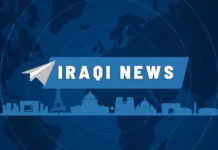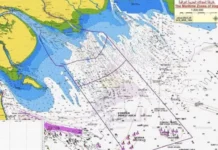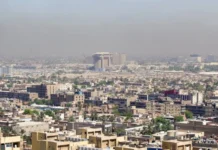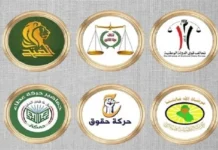Iraq Has About $100 Billion In Its Coffers: Withheld Reserves And Citizens Left Out Of The Equation – Urgent
Economy / Special Files Yesterday, | 7429 Baghdad Today – Baghdad In a country where people’s suffering is measured by the dollar exchange rate, and where development is reduced to questions about electricity, water, and jobs, a staggering figure stands out in international institution reports:
$106.7 billion in Iraq‘s foreign exchange reserves,
placing it third in the Arab world after Saudi Arabia and the UAE.
But behind this glittering figure lies an unanswered question:
Is this money truly available to Iraqis, or
is it frozen in accounts that can only be moved with the permission of the US Treasury?
The truth, as confirmed by experts, is that the
bulk of these reserves are deposited in American banks, and the
Iraqi government can only use them within narrow margins, subject to international approval, specifically from Washington.
Economic expert Haider Al-Sheikh told Baghdad Today on Thursday (July 10, 2025) that cash liquidity in Iraq is “fully available, whether in dinars or dollars,” noting that “foreign exchange reserves have exceeded $106 billion, while gold reserves have exceeded 163 tons, making Iraq fourth in the Arab world after Saudi Arabia, Lebanon, and Algeria.”
Al-Sheikh added, “This abundance came after years of sharp declines during the COVID-19 pandemic,
when oil prices collapsed.
However, the subsequent rise in prices and the change in the dollar exchange rate helped rebuild the cash reserve and raise reserves to unprecedented levels.”
Advanced ranking in the Arab region
According to data from the International Monetary Fund (IMF), Iraq ranked third in the Arab world in terms of foreign exchange reserves, ahead of countries such as Libya, Algeria, Qatar, Egypt, Kuwait, and Morocco.
The rankings are as follows:
Saudi Arabia: $449 billion
UAE: $210 billion
Iraq: $106.7 billion
Libya: $80 billion
Algeria: $72 billion
Qatar: $69 billion
Egypt: $47.1 billion
Kuwait: $41 billion
Morocco: $32.8 billion
Jordan: $21 billion
A promising market on paper, but constrained in reality.
The sheikh points out that the increase in reserve size gives Iraq “great economic attractiveness,”
making it a target for competition among major countries for investment opportunities,
such as the United States, China, Japan, and France,
due to its vast resources and sensitive geographic location.
But this attraction, experts believe, is hampered by a
fragile administrative reality, an
unstable legal environment, and a
volatile political climate.
This makes the flow of funds into Iraq a thorny process,
requiring more than hard numbers and cash reserves;
it requires a genuine will to reform.
And yet, despite these impressive figures, the question still lingers in the minds of Iraqi citizens:
When will state funds become tools for their service?
While the state is piling billions into banks abroad, the
majority of the population is still struggling to secure the basic necessities of life,
amid high unemployment, rising prices, and deteriorating services.
The deeper problem is that this massive reserve, which is supposed to be the country’s safety valve,
is not actually in hand.
Rather, the bulk of it is deposited in foreign banks, specifically the US Federal Reserve, and is subject to strict controls that prevent Iraq from using it freely or employing it in development or emergency projects without complex international approvals.
According to observers, ultimately, any financial figure is worthless unless it is translated into living reality.
While the state celebrates its ranking on reserve lists,
citizens are not looking for a ranking but rather an outcome:
Will this money be used
to protect the dinar?
To support prices?
To build factories?
To free the market from dependency?
Or will it remain a mere mortgaged asset,
from which Iraqis see nothing but
slogans of sovereignty and
headlines in international reports? https://baghdadtoday.news/278315-106.html
Al-Nusairi: The Central Bank Is Leading The Banking Sector Toward Comprehensive Reform, Economic Stimulation, And Sustainable Development.
Uses Economy News – Baghdad Economic and banking advisor Samir Al-Nusairi affirmed that the Central Bank continues to lead the Iraqi banking sector in accordance with its third strategy and its comprehensive banking reform project for the next two years,
based on a continuous daily work system in cooperation with international consulting and auditing companies currently operating with the aim of achieving banking reform and moving banks to a stage of contributing to stimulating the economy, revitalizing the economic cycle, achieving economic growth, and transforming banks into a lever for sustainable development.
Al-Nusairi explained in an interview with Al-Eqtisad News that
in order to motivate banks and develop banking operations so they can fulfill their duties stipulated in the Banking Law and the applicable instructions and executive regulations issued by the Central Bank, and serve the national economy and customers,
it is necessary to carefully
implement the reform measures outlined for them, as well as to
re-review, evaluate, and classify banks. ‘
Al-Nusairi pointed out that there are international standard criteria for classifying central banks that are agreed upon in most countries, such as
controlling inflation,
economic growth,
monetary stability,
independence, and the
extent to which economic goals are achieved.
Since central banks are subject to classification and
since they are the ones that monitor and supervise banks, the classification of Iraqi banks must be based on international standard criteria approved in most countries,
the basis of which is
compliance with international banking standards,
enhancing financial inclusion,
encouraging competition,
preventing monopoly in the banking market,
providing opportunities for shareholders and investors to obtain profitable and sustainable returns,
accelerating digital transformation, and a rapid transition to a solid national economy.
He explained that the reform, evaluation, and classification of the banking sector should be based on criteria of capital, assets, liquidity, profitability, and risk management.
Additional programs should be adopted that are consistent with the Iraqi reality, such as approving the banks’ operating results and final accounts for the last five years,focusing on analyzing assets, revenues, expenses, capital adequacy, indicators of capital investment, cash credit granted and its sectoral distribution, ‘
The return on capital ratio, return on assets, liquidity ratio, and the extent of banks’ compliance with applicable banking instructions, particularly activating the national strategy for bank lending to finance small and medium-sized enterprises and
applying environmental, social, and corporate governance standards. https://economy-news.net/content.php?id=57222
TIR Moves Iraq To Advanced Ranks In Global Trade
Economy 2025-07-11 | 1,478 views confirmed The General Authority of Customs the continued successful and seamless implementation of the international TIR system at a number of border crossings,a move it described as strategic.
It indicated that this move will advance Iraq to advanced levels in the field of international trade.
The Director of Transit at the General Authority of Customs, Ihab Talib, told the official agency, followed by Sumaria News, that
“the Authority has begun implementing the TIR system at all Iraqi border crossings,
in coordination with the International Road Transport Union (IRU), noting that
“the system comes within an agreement signed with the General Company for Land Transport,
which represents the guarantor of this project.” ‘
He added, “The implementation of this system represents a true activation of the transit system and aims to capitalize on Iraq’s strategic location as a link between Europe and the Middle East.”
He added, “The procedures are proceeding smoothly and in coordination with all relevant parties.”
He added that the TIR system
will contribute to Iraq’s advancement in international trade and
will help develop the transportation, technical, and logistics infrastructure sectors. He explained that
the project complements the Development Road Project, which the Iraqi government seeks to implement as part of a comprehensive plan to improve regional trade. https://www.alsumaria.tv/news/economy/533128/التير-ينقل-العراق-لمراتب-متقدمة-بالتجارة-العالمية
For current and reliable Iraqi news please visit: https://www.bondladyscorner.com






